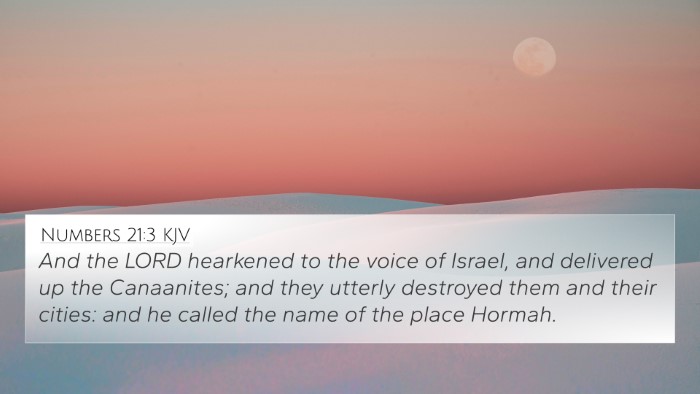Understanding Judges 1:17
Judges 1:17 states: "And Judah went with his brother Simeon, and they slew the Canaanites that inhabited Zephath, and utterly destroyed it. And the name of the city was called Hormah."
This verse describes a significant event during the conquest of Canaan, where the tribe of Judah teams up with Simeon to defeat the Canaanites in a city called Zephath, which they then destroy completely.
Verse Meaning and Interpretation
- Unity Among Tribes: Matthew Henry notes the importance of collaboration between the tribes of Judah and Simeon. This partnership signifies the unity among the tribes of Israel in God's mission to conquer the Promised Land.
- Divine Judgment: Albert Barnes emphasizes that the destruction of Zephath symbolizes God's judgment against the Canaanites for their wickedness and idolatry. This act is seen as a fulfillment of God's earlier commands to drive out the nations inhabiting the land.
- Implications of “Hormah”: Adam Clarke explains that the name "Hormah," meaning "destruction," reflects the outcome of God's warfare against sin and those who oppose His will. It marks a notable point of victory for the Israelites.
Thematic Connections and Cross-References
Judges 1:17 connects to several other passages that enhance its understanding:
- Numbers 21:3: The victory of Israel over the Canaanites and the naming of places related to destruction.
- Deuteronomy 7:1: God's command to Israel regarding the destruction of the Canaanite nations.
- Joshua 10:42: The overall success of Joshua in defeating kings and their cities, tying back to Judah's triumph in Judges.
- 1 Chronicles 4:39-41: More detailed accounts of Simeon's conquests, echoing their collaborative efforts with Judah.
- Hebrews 11:32-34: Reference to the faith and actions of judges including those who fought against the enemies of God.
- Judges 20:18: Another context of the tribes working together in battles, reinforcing the unity theme.
- Revelation 19:11-21: The ultimate battle between good and evil, illustrating God's righteous judgment similar to the actions in Judges.
Insights from Commentaries
Public domain commentaries provide additional insights that bring depth to Judges 1:17:
- Matthew Henry: Discusses the moral implications of Israel’s conquests, stressing that God's providence and power are evident through their victories, guiding them against idolatry.
- Albert Barnes: Points out the strategic importance of territorial control, as these victories helped solidify Israel's presence in Canaan and demonstrated their reliance on Yahweh.
- Adam Clarke: Adds that the phrase "and utterly destroyed it" reflects the seriousness of the task Israel faced in conforming to God's commandments regarding the Canaanites.
Cross-Referencing Biblical Texts
To effectively study Judges 1:17, utilizing tools for cross-referencing can deepen the understanding:
- Bible Concordance: Useful for finding related themes and verses across both testaments to see how God's plan unfolds.
- Bible Cross-Reference Guide: Allows one to see the connections between different biblical accounts of Israel’s conquests.
- Cross-Reference Bible Study: An excellent method to examine parallel passages, enhancing comparative analysis.
- Inter-Biblical Dialogue: Engages with how themes from Judges connect with later writings, especially in the prophetic and New Testament contexts.
Conclusion
Judges 1:17 serves as a profound example of Israel's journey in claiming the Promised Land amid divine directives. It showcases the importance of unity among the tribes, the severity of divine judgment on sin, and the faithfulness of God in guiding His people through their struggles. By employing cross-referencing strategies, readers can explore deeper insights and connections throughout the Scriptures.
Further Study Recommendations
For those seeking to find related verses and themes, consider exploring:
- How to find cross-references in the Bible: This can open up additional routes for study on geographic, historical, and thematic connections.
- Identifying connections between Old and New Testament: See how themes of judgment and victory traverse both testaments.
- Comparative study of Pauline Epistles: Understanding how Paul’s writings may reflect or reference the historical contexts described in Judges.
By analyzing Judges 1:17 through various lenses and tools, believers can gain a comprehensive understanding of God's Word and its implications for faith and practice today.







